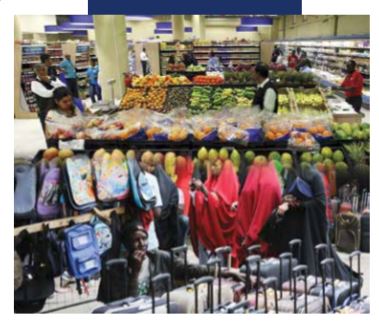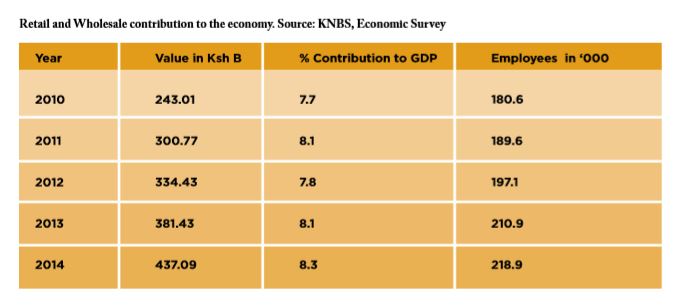By Edwin Musonye
Although retailing is a respectable and lucrative economic enterprise, some people still look down at it as a simple and ordinary pastime that is meant for novices only. A leading industrialist in Kenya was once reported saying that if the economy continues to deteriorate- he might be reduced to a mere retailer. The reality is that most local manufacturers are nowhere near Nakumatt, Uchumi, Tuskys, Naivas, and even Ukwala in terms of economic contribution.
Retailing and wholesaling contribute substantially to the economy. The most current estimates stand at 10% of GDP. The industry, until 2012 was leading in private sector contribution to payroll. Currently it is only second to education. It is not by chance that Kenya’s former president Mwai Kibaki– a seasoned economist -mentioned this fact in one of his speeches while still in office.
In fact, according to the Kenya National Bureau of Statistics, between 2007 and 2011 retailing was only second to transport and communication sectors as the main driver of economic prosperity in Kenya with an annual average of 18.8 percent growth far ahead of manufacturing at 10.3 percent.
Even though, retailing is considered a “basic activity”, it has grown to have a stature for itself. There exist now genres of retailing for example: self-selection stores, general stores, one hundred shilling stores, let alone online (non-store retailing such OLX and eBay).
Effective retailing will utilise expertise from various specialisations a leading one is logistics. Planning how the merchandise will be shipped in and out as well as distributed among the store outlets is required. Also, connected to this is the ability to evaluate and choose good locations for the premises. As simple as this may seem, it has determined the fate of many businesses small and big.
Whether the retailer has own trucks or relies on a transporting company to move products into the warehouse, and from there to the shops, it entails a proper coordinated schedule to reduce waste in time or idle capacity.
Additionally, there is stock or inventory management. inventory management will ensure that the economic order quantity is identified and applied. Understanding seasonal variations in consumer tastes, peak and low seasons is essential. Running out of stock items results in losses so does holding excess inventories.
Also, proper stores management to help embrace suitable movement methods is a skill. The seemingly outdated concepts such as LIFO (last in- first out) and FIFO (first in – first out) are essential. Knowing the method at play is important for inventory valuation after the stocktaking exercise as well as accounting and adjusting for price changes.
There is room for merchandising expertise especially for the traditional retailing concepts that require a store space. Arranging the items in an orderly yet, space-efficient and strategic manner is not guesswork. Understanding how high or wide to stake items is a real concern for those seriously in the trade. The shops’ layout should be optimised for effective selling. Ensuring that there is ready cash change for customers rather than offering sweets as the balance is an indication of professional trading.
It makes sense to recognise the best business hours to operate the stores for maximum returns. Knowing the busy hours will enable the management to avail more staff to attend to customers. A caring customer care service that knows how to handle complaints and especially returned damaged goods is key. Staying abreast of competitors’ strategies and plans is important for survival.
Ability to price correctly is indispensible. Of course the strategy must be spelt out early so that the target clients are known and made aware. If the aim is to offer the lowest prices then it must be clear on the onset. Knowing how to use the markup and mark down formulae effectively is crucial. Some traders especially the small ones, may put a markup of 10% on their purchases and when calculating the gross income from sales, apply the same 10% instead of 9.09% as the markdown. This often leads to an overstated income and attract undue taxation.
It makes sense to recognise the best business hours to operate the stores for maximum returns. Knowing the busy hours will enable the management to avail more staff to attend to customers. A caring customer care service that knows how to handle complaints and especially returned damaged goods is key.
Ensuring worthwhile atmospherics is essential. The premises are designed to have an adequate and right type of lighting, they should also have good scents, music, temperature, and be clean, in order to attract and maintain customers.
The right scents at the food department should make anyone hungry. Soothing melodies are selected to make customers stay longer; forget the crude blaring sounds played in ‘exhibitions’ stores along Ronald Ngala street.
Another critical issue in retailing is security. Containing shoplifting is an area employing expertise and resource investment. The menace can wipe up a substantial percentage of profit if not successfully managed. Ability to be courteous to customers while still being vigilant to the few that may be dishonest comes in handy.
Moreover, general internal business departments including finance and human resources are incorporated to ensure compliance, optimisation of resources, as well as enhancing overall professionalism. Procuring external support services such as insurance and auditing increases prospects for success. Then, maintaining a good relationship with suppliers, financiers, and investors cannot be overemphasised.
For the different genres, there is a standard for deciding one is a supermarket or merely a self-selection sore. The shop floor space and the ratio of composition of stock for both food and nonfood products determines a supermarket. A supermarket must have at least 10,000 square feet space and ensures it stocks more foodstuff than other items. Specialty and department stores could also be spacious but they mainly do not stock a very wide range of products and especially the food items.

There is a remarkable increase in the use of technology to assist in running and managing operations in the retail trade. Conversely, it is these technical traits that obstruct many small traders from expanding into big operations. However, investing in learning and being courageous will propel any shopkeeper to a great level of achievement.




